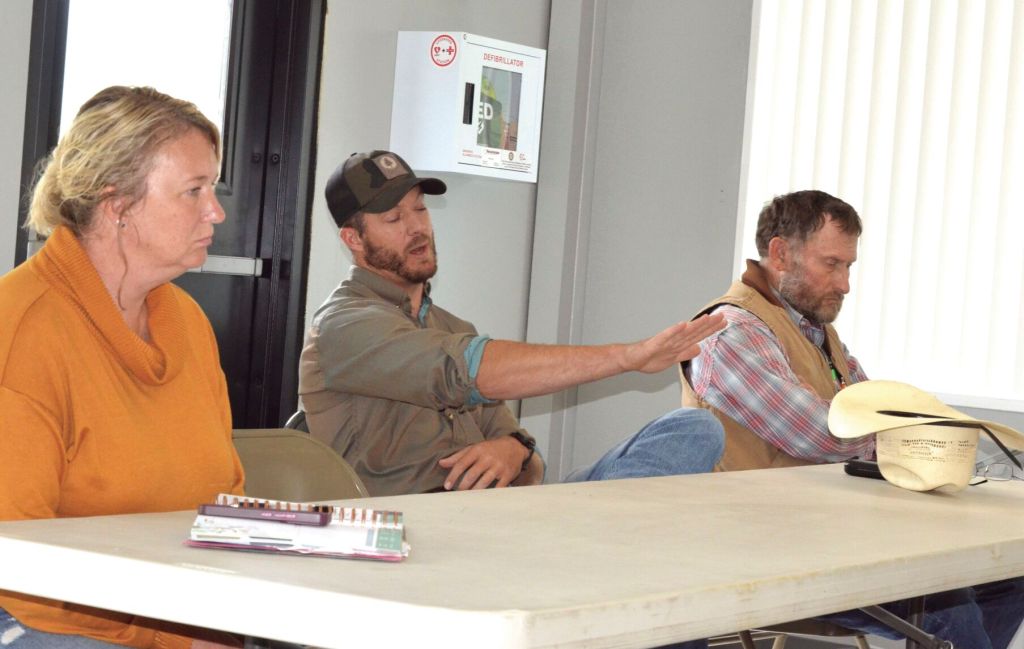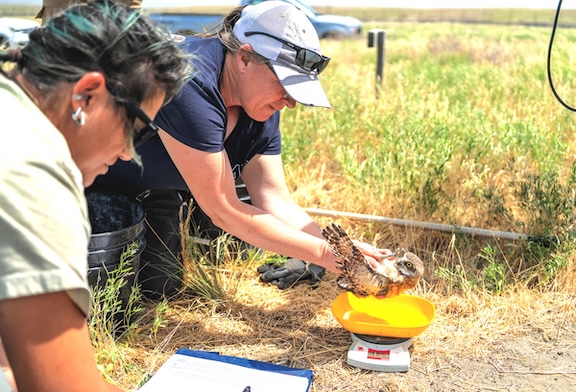Lawmakers discuss hopes for legislative session
Published 5:00 am Monday, September 30, 2024

- From left, Lisa Collier, Devin Patton and John Williams ask Senate candidate Todd Nash and state Rep. Bobby Levy, R-Echo, about plans for the legislative session that begins in January. Collier and Patton are running to replace Nash on the Wallowa County Board of Commissioners and Williams is co-chairman for Eastern Oregon of the Oregon Cattlemen's Association's wolf committee. Nash and Levy met with locals Sept. 16, 2024, at the Wallowa County Fairgrounds in Enterprise.
ENTERPRISE — Wolves. Housing. Health care. Firefighting.
Trending
Officials from Wallowa County and Eastern Oregon are targeting these issues in the legislative session that begins in January.
State Rep. Bobby Levy, R-Echo, and Wallowa County Commissioner Todd Nash, the Republican nominee to replace retiring Sen. Bill Hansell, met Sept. 16 with about 10 people at the Wallowa County Fairgrounds to talk about their priorities for the session and to solicit thoughts about other issues that might require legislative attention.
“I’m really hoping that we get the wolf compensation bill passed this time for the producers up here in Wallowa County and everybody else,” Levy said. Such a bill would increase the financial compensation livestock producers receive for wolf predation.
Trending
Levy is hoping for the federal government to delist wolves throughout the entire state. Wolves west of state Highway 395 still fall under the protection of the federal government, but the state manages wolves east of the highway.
If Donald Trump wins the presidential election, Levy said, “hopefully we’ll get them delisted.”
John Williams, who is Eastern Oregon co-chairman for the wolf committee of the Oregon Cattlemen’s Association, recalled his efforts to convince lawmakers to improve wolf management.
“When we were in the legislative houses trying to get the wolf bills passed into law, one of the biggest answers I got was, ‘You know, we understand your issue; we feel your pain, but until we get this fire thing fixed, we can’t even think about it,’ “ Williams said.
He was referring to legislative efforts to find ways to pay for fighting wildfires. The short legislative session of 2024 included separate proposals, but none passed the Legislature. The 2025 session is expected to take up the issue again.
On another topic, Levy said she was working on a bill inspired by Casey’s Law in Kentucky, which provides a means of intervening with someone who is unable to recognize their need for treatment. The law allows parents, relatives and friends to petition a court for treatment on behalf of the substance abuse-impaired person.
Levy said the law has been successful in Kentucky in getting youths into rehabilitation programs.
Housing
Brooke Pace, director of communication and experience for Wallowa Memorial Hospital, asked Levy and Nash about their support for health care, which led to a discussion of the lack of housing available for health care workers.
Nash mentioned he’d been approached to support a bill that would aid small lumber mills in the state and said it could have some effect, although he noted few mills are now operating in Wallowa County. He said Ken Hall, the late building codes director, said houses are being built with lumber that isn’t as good as can be obtained at JayZee Lumber in Joseph and that it would be great if local materials could be used.
Nash said in Wallowa County, a lot of the local timber isn’t worth the cost to haul it to La Grande, Elgin or to Lewiston, Idaho.
“We’re a little bit of an economic desert” for timber, Nash said.
Pace also said she is hoping lawmakers can support health care education to help keep local young people in rural Oregon communities like the ones in Eastern Oregon.
“It’s very hard to recruit people to come work in rural health care if they didn’t grow up in a rural facility or a rural area, because rural is very much viewed as being older and sicker and poorer, and who wants to go practice any type of medicine in an area like that, unless you have a call to it,” Pace said.
She said Wallowa Memorial has banded together with other hospitals to seek a workforce education grant, which they’re still waiting to hear on.
But housing remains a major issue for the hospital and other county employers, she said.
“The rental market is so dismal,” she said. “Recently I was talking to a housekeeper who is a single mother with two children, who has a good job, but obviously can’t afford $1,200 a month for a market rental, but at the same time, makes too much to qualify for low-income housing, so she’s just really stuck in the middle, and actually contemplated quitting her job so that she would qualify for low-income housing.”
Nash said he hopes to push a measure, inspired by a so-called “Border Bill” that was passed for Malheur County in 2017 that created a new district focused on economic development, housing, workforce training and land-use challenges. Commissioner John Hillock pushed a similar bill for Wallowa County in the 2023 Legislature, but the bill never emerged from the powerful Ways and Means Committee.
Nash also noted Wallowa County has one of the highest per-capita rates of absentee ownership in the state, but he knows county residents don’t want to give up their vacation homes for workforce housing.
Levy agreed: “I also understand the people who don’t want this to change.”
Nash added in District 58, Levy’s district, which includes Wallowa County, “you know we need the housing, but we also have a very staunch group that doesn’t want to change their community.”









